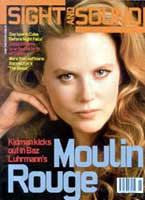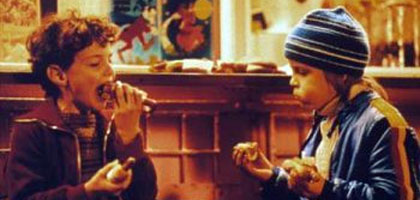
House Rules

In Lukas Moodysson's Together, life in a 70s commune is much funnier than he intended. Geoffrey Macnab talks to him about Abba, nudity and fundamentalism
"A young master's first masterpiece. We have perhaps unreasonable expectations..." (Ingmar Bergman on Fucking Åmål)
There's something approaching an Oedipal struggle in Swedish cinema. Father figure Ingmar Bergman casts such a long shadow that few younger film-makers can escape being compared - generally unfavourably - to him. It's a measure of Lukas Moodysson's impact that after only two features - Fucking Åmål (1998) and Together (Tillsammans, 2000) - Scandinavian journalists are already talking about 'the Moodysson effect'. The fledgling auteur - born in 1969 and also the author of a volume of poetry, a novel and several award-winning shorts - is being championed as the director who can spearhead a renaissance in Swedish cinema and cast off the yoke of Bergman in the process.
As Moodysson acknowledges, this is a perverse idea: it's as if Bergman, in spite of his towering achievements, is as much resented as revered, and Moodysson has been chosen to topple him. 'I think it's really sad that there's a tendency in Sweden today to speak ill of Bergman,' Moodysson says. 'To me it seems he's just a lonely sad old person who sits in his big house and reads in the papers that his days are over.' Earlier this year Moodysson wrote to Bergman (whom he's never met) to express his admiration and solidarity. 'I didn't know what to say so I just wrote that Fanny and Alexander is one of the best films I've ever seen. I would be very sad myself if one day - in the year 2040 or something - I was the greatest film director in Sweden and everybody was putting me down. I don't want that to happen.'
Like Bergman, Moodysson is not universally appreciated in Sweden despite the critical and popular success of his first two movies. 'People don't like me in the Swedish film industry,' he says. 'Sweden's a very small country and it's very easy to be disliked. I suppose I've criticised other directors and the general climate of the industry in a way that's not always been polite, but I think it's important to express your feelings. Then there are little jealousies because I'm successful.'
Moodysson's debut feature Fucking Åmål (or Show Me Love as it was retitled for the UK) charts the teenage love affair between two girls, the popular Elin (Alexandra Dahlström) and the vegetarian outcast Agnes (Rebecca Liljeberg). In the more expansive Together, set in a 70s commune, Moodysson puts an entire generation under the microscope. He shows both the idealism and the narcissism of his hippie protagonists, their utopianism and their political dogmatism. He suggests that free love can be a licence to trample over people's feelings, but also reveals the warmth and tolerance with which the commune dwellers treat one another - qualities in short supply in the frosty bourgeois household next door. The film begins with news of the death of General Franco, an event the household celebrates as if it was Christmas. We witness the subsequent goings-on through the bemused eyes of a brother and sister, children of a housewife who's temporarily left her abusive husband and sought sanctuary in the commune.
Geoffrey Macnab: Did your own background correspond to what we see in the film?
Lukas Moodysson: My family were farmers, hard-working farmers in a place called Småland. Småland in Swedish means small land, and it was a difficult place where the ground was full of stones. Then in the 60s my father had the chance to study to become an engineer. He came to the university town of Lund, which is where I was born. He met my mother, who is also from Småland - her father worked in a hardware store. I don't think they were exceptionally alternative in their lifestyle, but they were influenced by the leftist movement. In the 60s and 70s a lot of people from working-class backgrounds had the opportunity to move up. In Sweden today such opportunities are fewer.
You tread a fine line between affection for your characters and caricature.
I started this project with a lot of sympathy for the characters' ideals and utopian dreams. I really liked them and you don't want to destroy people you love. I tried to write touching, sad, serious scenes, but a lot of the time they turned out to be funny - often funnier to other people than to myself. I don't see the film as so much of a comedy as others do.
Certain critics have said you're harsh to the point of being reactionary about the commune.
I wanted to get across my ideas of what was good and what was bad about this movement. I was also interested in what happens when ideals clash with reality. The bad thing for me was the fundamentalism - the dogmatic rules that could be very hurtful and in the end destroyed the movement's potential to change society. For instance, they really hated Abba - music that was extremely popular among ordinary working-class people. They could never win such people over by boycotting the Eurovision song contest and stuff like that. I think that if they'd tried to open up they'd have had greater potential to change things.
What does Abba music mean to you?
In Sweden today Abba is recognised as kitsch but it has a very sentimental and nostalgic pull - it's associated for many of us with childhood and growing up. I wanted to use Abba's 'SOS' at the beginning of the film - I thought it would be too sad as a closing motif. For me it's a really serious, sad song about breaking up but I was afraid the seriousness would be destroyed by nostalgia. But it worked out well because it relates to a song at the beginning. It was broken and now it's fixed.
Are you glad you didn't grow up in a commune?
A lot of children who lived in communes were hurt by it, as in the film. Some of the actresses I used grew up in communes in this period - some had a great time but I've also heard stories about bad experiences. It was quite strange for them in making the film to have to dress up and act like they remember their parents doing.
Did you shoot in a studio or in an actual house?
In a house. One of the fun things about film-making is being able actually to create your imaginary world - like when my son plays with his Pokémon - putting up the posters, choosing the right furniture.
That scene where Jessica Leidberg is standing in the kitchen without any underwear complaining she has a fungal infection reminds me of the bit in 'Short Cuts' where Julianne Moore argues with Matthew Modine, seemingly oblivious to the fact she isn't wearing any clothes. Why did you use nudity in this way?
I'm interested in nudity, but not necessarily in a sexual way. Nudity like this is showing a person when he or she has stripped off the layers of social propriety. But I don't know why I wrote that particular scene - when I'm working on a script it's as if I'm walking through this world in my mind and seeing what could happen in this room, what could happen when they have dinner.
You don't use handheld camera very much.
We tried to put the camera as far from the actors as possible. It looks great - and I think it's interesting to zoom in from the whole picture to a detail. But the real reason for shooting in this way is to give the actors as much freedom as possible. I didn't want them to be constrained by tape marks or rules about lighting. I wanted the actors to decide what they were going to do and the camera to follow what happens. It's always on a tripod except for two or three scenes in which we wanted to follow fast action through lots of rooms when we had to use handheld. Cassavetes was an inspiration.
How do you react to the suggestion that you've helped Swedish cinema escape the yoke of Bergman?
For my generation Bergman was never a burden. And I think it's sad people have to knock him down. I've heard a lot of stories that aren't so sweet about him - about the way he deals with people and the way he uses his power. But those are rumours. In the end I think it would have been better for Swedish cinema if Bergman had been more influential. Swedish cinema during the 80s and 90s was crap.
Is there a direct link between 'Fanny and Alexander' and 'Together'?
When I was 10 or 12 years old Fanny and Alexander was an important film for me. I related very strongly to Alexander - I had the same experience in that my parents also got divorced. This film is like a dream for the children of divorced parents - they want their parents to get back together and in this film they do. It's like my childhood dreams.
